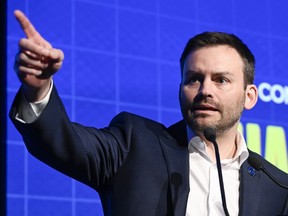“We are seeing a political exercise that closely resembles the federalist fear campaigns of the 1980 and 1995 referendums,” Paul St-Pierre Plamondon writes

QUEBEC — The leader of the Parti Québécois has accused federalists of fearmongering about independence in picking holes in the party’s Year 1 budget for the theoretical new country.
“We are seeing a political exercise that closely resembles the federalist fear campaigns of the 1980 and 1995 referendums,” Paul St-Pierre Plamondon writes. “André Pratte has essentially decided to relaunch the No camp.”
Written under the leadership of former journalist and senator André Pratte, three respected economists, with federalist ties, ripped into the PQ’s document, describing it as flawed and resting on “unrealistic premises and regrettable omissions.”
St-Pierre Plamondon zooms in on Pratte and the economists he chose to write the report.
While Pratte is the current chairperson of the Quebec Liberal Party policy committee and one of the economists, Alain Paquet, a former Liberal MNA and junior finance minister, the other two are not officially affiliated with any party even if they have federalist leanings.
They are Robert Gagné, a professor at HEC Montréal, and Louis Lévesque, a former federal intergovernmental affairs deputy minister.
All four said they were speaking in their own names with Pratte adding the Quebec Liberal Party did not commission or sanction the document.
St-Pierre Plamondon brands them all “Liberal economists.”
He said with the exception of former PQ finance Minister Nicolas Marceau who worked on the report, the economists the PQ used to draft their budget were independent of the party and worked in different universities.
Without responding directly to the criticism of Pratte’s group, St-Pierre Plamondon notes the new report focuses mainly on the methodology used in the PQ study even though it is the same as what was used in the old Bélanger-Campeau studies on the same theme.
He does welcome, however, news that the Pratte document recognizes the financial viability of an independent Quebec “something that would have been unthinkable a few years ago.”
He says it would be wrong to get bogged down in methodology. Should the PQ take power in 2026 it will redo the whole exercise before calling the independence referendum it is promising, he said.
“This exercise, which is interesting from a theoretical point of view, does not reflect our political choices because of its pro forma nature,” St-Pierre Plamondon said. After taking power, “we will be able to focus on the heart of the issue and not on the methodology.”